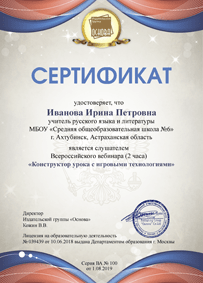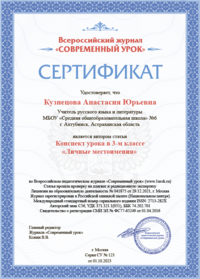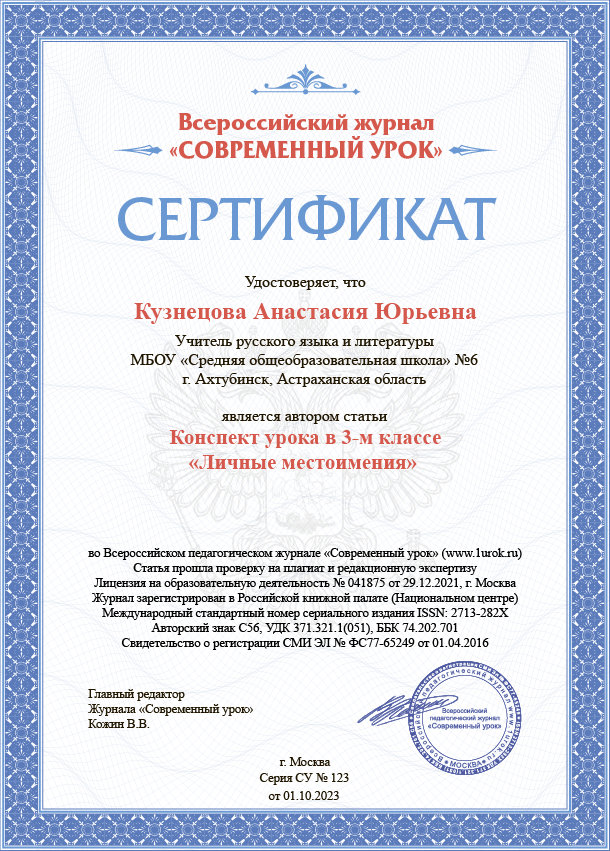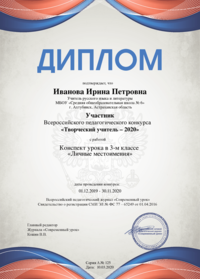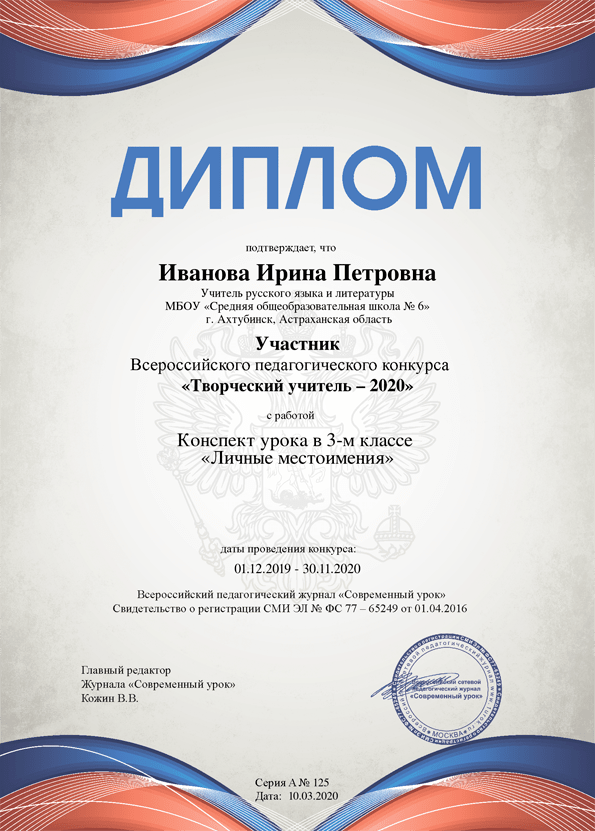Методическая разработка к текстам из звукового пособия к учебнику для 4 класса, Английский язык, И.Н. Верещагиной
Автор: Зуева Ольга Александровна
Организация: ОГАОУ лицей №20
Населенный пункт: г. Ульяновск
- № 3. Exercise 4.
Part 1.
STEP 1.
- Discussion
-Have you got a pet?
-What is it?
-What colour is your pet?
- What can it do?
- Do you love your pet?
- What animals do people usually keep as pets at home?
2. Teacher: «Today we are going to learn what animals are the most favourite pets».
3. Key words:
even- даже,
more than one- более одного( животного),
at all- совсем.
STEP 2.
Listen to the text for the first time . Try to understand the main idea .
STEP 3.
Translate the sentences with the key words from Russian into English:
- People buy tasty food, toys, presents and even clothes for pets.
- Some people have more than one pet.
- Some people do not have any pets at all.
STEP 4.
Listen to the text for the second time. Try to remember the details.
STEP 5.
1. Underline the words which are not mentioned in the text.
a). India, America, Africa, England, Canada, Russia
b). Look after, buy, keep, write
c). Clothes, food, toys, computers, presents
d). Birds, monkeys, giraffes, frogs, hamsters
- Make up the words denoting the names of animals. Say which of them are wild and domestic.
- n, a, s, e, k
- o, g, d
- t, a, c
- p, y, p, u, p
- g, f, o, r
- n, k, t, e, i, t
- s, i, f, h
- m, h, a, r, t, s, e
- k, y, o, n, m, e
- t, s, o, r, i, t, o, e
3. What animals are usually the most favourite pets?
4. What proverb is mentioned in the text? Explain it in your own words.
Part II.
Step 1.
Listen to the text for the first time and try to understand the main idea.
Step 2.
Listen to the text for the second time and answer the question:
« Do people sometimes keep wild animals as pets? Why?»
Step 3.
- What kinds of animals are mentioned in the text?
- Complete the sentences:
a). From … and … we learn that wild animals can become … too.
b). People sometimes find little animals in the … , … , … and other places.
c). The cubs have no … to take care of them and they can`t … without any … .
d). People often take them … and … after them. They try to … .
e). It is not always easy to help animals because many people don`t know how to … cubs or how to … … of them.
f). Sometimes people give them to the … or … where they become … .
- True , False, Not Stated.
- People don`t help wild animals.
- People keep wild animals as pets.
- Wild animals don`t like to live with people at home or near them.
- People can find wild animals in different places.
- Animals can become actors at the zoos or circuses.
- № 4. Exercise 4.
Step 1.
Discussion on the topic «Holidays»
Listen to the text for the first time and try to understand the main idea.
Step 2.
Listen to the text for the second time and say:
- what holiday Evelyn celebrated on the 25th of December;
- what present she got.
Step 3.
- Give the right adjective to the noun:
- … boxes
- a… doll
- … … eyes
- a … dress
- a … dinner
- … toys
- Put the sentences in the correct order
a). It was still dark.
b). During the day we watched Christmas TV and played with our toys.
c). On the 25th of December we got up early.
d). The presents were under the Christmas tree in coloured boxes.
e). Late in the afternoon we had a traditional dinner of turkey with vegetables and salads.
f). I ran to my mother and looked under the Christmas tree.
g). Santa Claus with his bag was not there.
- If Evelyn saw these things put down «+»
|
boxes
|
books |
toys |
jeans |
a cake
|
turkey |
fruit |
presents |
salad |
cats |
TV |
bags |
|
|
|
|
|
|
|
|
|
|
|
|
|
4. Give your own title to the text.
- № 10. Exercise 6.
Part 1.
Step 1.
Listen to the questions for the first time.
Step 2.
Listen to the speaker and complete the questions.
- When … you have … ?
- Do you … your P.E. classes?
- What do you … in P.E. class?
- Do you … a … when you have P.E. ? What is it …?
- Are you … in it or not?
- Do all … and … wear … when they have P.E. ?
Part 2.
Step 1.
Listen to the speaker.
Put the words in the right order and make up the questions.
- have, do ,When ,Handicraft ,you ?
- it ,do, when ,What, you, have ,do, you?
- write ,exercise books ,Handicraft, in ,Do, you ,your ,when, have, you ?
- go, with ,teacher ,Do ,Handicraft, museums ,your ,you, to, of ?
Step 2.
Check up the questions of your partner using the examples given on the blackboard.
Step 3.
Answer the questions.
- № 16. Exercise 6.
Step 1.
Listen to the questions. What are they about?
Step 2.
Put the questions in the order in which the speaker pronounces them (a teacher writes the sentences in a wrong order ).
Step 3.
Answer the questions.
- № 21. Listening Comprehension Lesson.
Step 1.
Listen to the text «Better Late Than Never» and try to understand it.
Step 2.
Listen to the text again.
Read the statements. Find and correct the mistakes.
- One Friday evening Finy Fox and Shiny Fox , the two little sisters, were walking to the park.
- They walked quickly for 20 minutes.
- It was half past nine.
- The Foxes wanted to study.
- On Wednesday they had Music, Maths ,Handicraft ,P.E. ,Art and Nature Study.
- The classes were not important.
- Two brothers came to school I time.
Step 3.
Use the plan to retell the text.
1. Two brothers.
2. A good idea.
3. Having fun.
4. School day on Wednesday.
5. Playing outdoors.
- № 25. Exercise 7.
Step 1.
Listen to the text for the first time. Give it a title.
Step 2.
Listen to the text for the second time and do the test.
Step 3.
- Test.
1.The name of the main character is…
a) Peter b) Pete c) Andy
2. He lives in a …
a) house b) flat c) cottage
3. He lives in the …
a) city b) town c) country
4. There are … rooms in his…
a) four… house b) five … flat c) two… cottage
5. He has got …
a) a hall b) a toilet c) a hall and a toilet
6. When the main character goes out he locks the door with the…
a) pen b) key c) clock
7. The main character goes to town by …
a) car b) bus c) taxi
- Which words are not mentioned in the text:
- flat , house , cottage
- living room, garden ,garage
- country, city, village
- plane, bus , car ,bicycle
- behind ,opposite, near
3. Answer the questions after the text in a written form.
- № 35. Listening Comprehension Lesson «A Strange Burglar in Big Mountains».
Step 1.
Listen to the text for the first time. Try to understand the main idea.
Step 2.
Listen to the text for the second time and do the tasks.
1. True False Not Stated
- The Jackson family lived in the country
- They wanted to spend Thanksgiving in Big Mountains
- There were five of them.
- It was cold outdoors.
- There was a small apple garden and big trees near the house.
- They saw six chairs in the sitting room.
- The carpet was red.
- The curtains were orange.
- The kitchen was small but nice.
- There was a table and ten chairs in the kitchen.
- The bathroom and the toilet were downstairs.
- Describe the rooms : a sitting room, a kitchen, bedrooms.
Use the following adjectives:
- beautiful
- large
- big
- small
- quiet
- lovely
- comfortable
- nice
4. Describe your favourite room in your own flat or house.
VIII. № 48. Listening Comprehension Lesson. «Don`s Letter to His Friend»
Step 1.
Listen to the text for the first time.
Answer the questions:
- What country does Donald live in?
- Does he live in the city, in the town or in the country?
Step 2.
Listen to the text once again. Fill in the gaps.
Many people write letters to friends in other countries. They often write about their families and … or about the … they live in.
Here is Don`s letter to his friend.
My name is Donald but my friends call me Don. We live in …, in a small … far from the … centre. Our … is small, but there is a … in it, in the … square.
The streets in my … are not very …, but they are very beautiful, with a lot of flowers and trees. Our … is in the … part of the town. You can see an old … … in that part. It was built many centuries ago and nobody knows the name of the … . The tower is very … and there is a large … in it. You can hear it ring … a day. The tower has become our town … . If you visit this place, turn to the … and the … will lead you to a beautiful small … . When you cross the … you will be in the new part of the town.
The streets are … in this part. There are also many … and …, as well as some … .
I have already been to many places of interest in our town and can show them all to you. If you have never seen … come and stay with us. Maybe you`ll find our life here quite different from your life in the …, but I`m sure you`ll like our … town.
Step 3.
Tell your classmates about Don`s place of living in your own words.
IX. № 60. Listening Comprehension Lesson. «Robbie`s Grandfather»
Step 1.
Listen to the text for the first time.
Step 2.
Say if the sentences are True or False.
- Grandfather lives in the North of Scotland.
- He is nearly 60.
- Robbie`s Grandfather doesn`t work.
- He is an engineer.
- The pupils are very tired in his class.
- Grandfather speaks in a friendly voice.
- He goes to school by car.
- He works six days a week.
- Grandfather likes traveling most of all.
- He only travels by sea.
- Last month grandad travelled to England.
- His trip wasn`t lucky.
Step 3.
Listen to the text for the second time. Try to remember the facts about the trpip to Scotland.
Step 4.
Speak about grandfather`s trip to Scotland using the plan:
a). An unlucky trip
b). Missing the train
c). A silver box
d). Getting to the hotel
e). Luggage
f). Lift
g). In the morning
- № 72. Listening Comprehension Lesson. «TV INTERVIEW»
Step 1.
Listen to the text for the first time.
Step 2.
Answer the question: «What are Mr Davis`s hobbies?»
Step 3.
Listen o the text for the second time and then write out the words and word combinations on the topic «Hobbies».
Step 4.
Speak about your hobby ( hobbies ) to your teacher and classmates.
- № 85. Listening Comprehension Lesson. «Americans out for the Evening»
Step 1.
Listen to the text for the first time and answer the questions:
- Where can Americas go in New York?
- Where can Americans go in small towns?
Step 2.
Listen to the text once again and complete the sentences.
- It is easy to go out for the evening in New York as there are a lot of … there.
- Many of the theatres travel from … to … .
- There are «… theatres» in New York where you can sit at table and eat dinner and then watch the show.
- It`s cheaper to go to the … .
- Americans say «to go to the …» not «to go to the cinema»
- You can see the … film at the cinema.
- Americans have given many forms of music to the world: …, … and … .
- This music comes from … with black people.
- You can also hear … music n America.
- Americans like to … very much.
- Americans love … of all kinds.
- Many people play sports and many go to see games or watch them on … .
- In … people usually shout loudly for their favourite … .
- One of the most popular sports is … .
Step 3.
Retell the text you have listened.
Step 4.
Make up a story about your free time. How do you spend it?
- № 90. Listening Comprehension Lesson. «What Does the Average American Do?»
Step 1.
Listen to the text for the first time.
Step 2.
Test.
- The average American sleeps … hours a night.
a) 6 b) 7 c) 7,5
- The average American takes a shower … .
a) every day b) twice a day c) 3 times a week
3.The average American goes to the … once a month.
a) shop b) cinema c) theatre
4.The average American watches TV … hours a day.
a) 4 b) 5 c) 3
5.The average American goes to the … once a year.
a) country b) UK c) dentist
6.The average American reads the … every day.
a) magazine b) newspaper c) book
7.The average American eats … hamburgers a week.
a) 5 b) 7 c) 3
8.The average American drinks a cup and a half of … a day.
a) tea b) coffee c) juice
9.The average American lives in a …
a) house b) flat c) cottage
10.The average American eats at a fast food restaurant …
a) twice a month b) once a month c) once a week
- The average American listens to the radio … hours a day.
a) 2 b) 3 c) 4
12.The average American goes to bed … 12.00.
a) after b) at c) after
13.The average American wears … in bed.
a) slippers b) pyjamas c) shorts
Step 3.
Write down the questions after the speaker and answer them in a written form.
- № 95. Listening Comprehension Lesson. «The Main Street of Moscow»
Step 1.
Listen to the text for the first time and try to understand it.
Step 2.
What are they? Complete the word combinations.
- Tverskaya …
- Red …
- «Natsional» …
- Central …
- Pushkin …
- the English …
- the Museum of the …
- Belorussian … …
- Triumfalnaya …
- Moscow Concert …
Step 2.
What famous people are mentioned in the text?
Step 3.
Listen to the text once again and do the task.
Step 4.
- Tverskaya Street is the … street of the Russian … .
- There are many … , … and … in it.
- This street is famous for its fine tall … , wide …, … and … which are in or nearby.
- Tver is an old Russian … to the … of Moscow.
- In some places the street is … metres wide.
- At the beginning of Tverskaya Street you can see the … .
- Yuri Dolgoruky is a … of Moscow.
- In … … we can see the famous monument to Alexander Pushkin.
- The monument appeared in Moscow in … .
- You can see the monument to … … in Triumfalnaya Square.
- You can see the monument to … … in front of Belorussian railway station.
- №100. Listening Comprehension Lesson. «Some Russian Holidays»
Step 1.
Listen to the text for the first time . Try to remember the main holidays in Russia.
Step 2.
Listen to the text for the second time and then fill in the table.
Step 3.
|
Holidays |
Date |
Traditions |
|
The New Year`s Day |
|
|
|
The 23d of February |
|
|
|
Women`s Day |
|
|
|
Maslenitsa |
|
|
|
Easter |
|
|
|
May Day |
|
|
|
Victory Day |
|
|
Step 4.
Speak about all these holidays and compare their celebrations with English traditions.
Step 5.
Write a composition on the topic «My favourte holiday».
Рекомендации по использованию методической разработки к текстам из звукового пособия к учебнику И.Н.Верещагиной «Английский язык»
4 класс.
Методическая разработка предназначена для учителей английского языка, работающих по учебно-методическому комплекту для IV класса И. Н. Верещагиной , Т.А. Притыкиной.
Пособие призвано прежде всего оказать помощь учителю в организации и проведении контроля в области аудирования в IV классе.
Данное методическое пособие содержит предтекстовые и послетекстовые упражнения для контроля умений и навыков в области аудирования.К каждому тексту из звукового пособия предлагаются дополнительные задания разного уровня сложности, которые преподаватель может использовать на свое усмотрение, учитывая уровень обученности и степень подготовленности учащихся. Также преподаватель английского языка имеет возможность использовать разнообразные формы контроля с применением различного рода наглядности.
В основном в пособии не выносятся рекомендации по проведению предтекстового этапа, так как работа с новыми (опорными) лексическими единицами, встречающимися в текстах, и предварительные беседы с учащимися на темы, смежные с прослушиваемыми текстами, организовываются также на усмотрение педагога.
Полный текст статьи см. приложение

